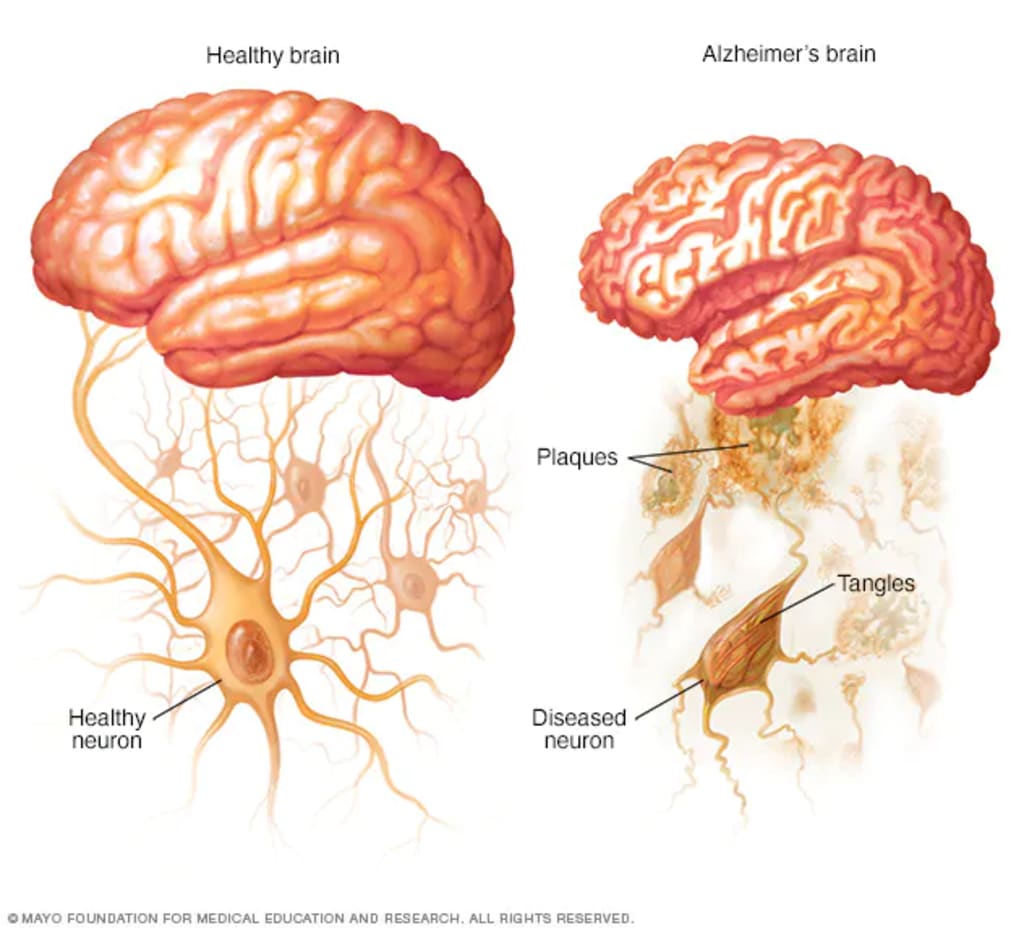"Protecting Cognitive Health: Strategies for Reducing Alzheimer's Disease Risk"
"Promoting Brain Health Through Lifestyle Choices and Early Interventions"

Alzheimer's disease is a progressive neurodegenerative disorder that affects the brain, particularly the areas responsible for memory, thinking, and behavior. It is the most common cause of dementia, a group of symptoms that impair cognitive functions significantly. The disease was first identified by Dr. Alois Alzheimer in 1906, hence the name.
The exact cause of Alzheimer's disease is not entirely understood, but researchers believe it involves a combination of genetic, environmental, and lifestyle factors. The hallmark characteristics of the disease are the abnormal accumulation of proteins in the brain. Beta-amyloid plaques build up between nerve cells, while tau protein tangles form within the cells, disrupting their normal functioning and leading to nerve cell death.
Alzheimer's disease typically progresses in stages. In the early stages, individuals may experience mild memory loss and cognitive difficulties, which are often mistaken for normal signs of aging. As the disease advances, the symptoms become more severe, including increased memory loss, confusion, language problems, and changes in behavior and personality. Performing everyday tasks becomes challenging, and individuals may require assistance with even basic activities.
Diagnosing Alzheimer's disease involves a comprehensive medical evaluation, which includes assessing medical history, cognitive tests, and brain imaging. Early detection is essential to begin appropriate management and provide support to affected individuals and their families.
While there is no cure for Alzheimer's disease, treatments are available to help manage symptoms and slow down its progression. Medications, such as cholinesterase inhibitors and memantine, are commonly prescribed to improve cognitive function and enhance the individual's quality of life.
Beyond medications, lifestyle modifications are also recommended to support brain health. Regular physical exercise, a balanced diet, mental stimulation, and social engagement are thought to be beneficial in maintaining cognitive function and overall well-being.
Alzheimer's disease is the most common cause of dementia, accounting for around 60-70% of all cases of dementia.
Global Impact: An estimated 50 million people worldwide were living with dementia in 2021, and this number is projected to increase significantly as the population ages.
Age and Risk: The risk of developing Alzheimer's disease increases with age. It is most common in people aged 65 and older, but it can also affect younger individuals in rare cases.
Economic Burden: Alzheimer's disease places a substantial economic burden on families and healthcare systems. In 2021, the global cost of dementia care was estimated to be over $1 trillion, and this is expected to rise in the coming years.
Gender Differences: Alzheimer's disease is more prevalent in women than men. One reason for this difference is that women generally live longer, and age is a significant risk factor.
Impact on Caregivers: Alzheimer's disease can have a significant impact on caregivers, who often provide substantial support and assistance to affected individuals. The physical, emotional, and financial toll on caregivers can be substantial.
Research Efforts: There is ongoing research into Alzheimer's disease to better understand its causes, risk factors, and potential treatments. Scientists are working to find more effective therapies and potentially develop ways to prevent or delay the onset of the disease.
Remember to verify the most recent statistics from reputable sources such as the World Health Organization (WHO), Alzheimer's Association, or other healthcare organizations for the latest information on Alzheimer's disease.
Research into Alzheimer's disease continues, with ongoing efforts to understand its underlying mechanisms and develop more effective treatments. Public awareness and funding for research are vital to combat this devastating condition and improve the lives of those affected by Alzheimer's disease. Early intervention, education, and support for individuals and their caregivers remain crucial in managing the challenges posed by this condition.
Preventing Alzheimer's disease
Preventing Alzheimer's disease is a topic of significant interest and research, though it is essential to note that there is no guaranteed way to completely prevent the disease. However, several lifestyle factors have been associated with a reduced risk of developing Alzheimer's disease and can potentially contribute to maintaining cognitive health as we age.
Regular Physical Exercise:
Engaging in regular physical activity has been linked to a lower risk of cognitive decline and Alzheimer's disease. Exercise promotes better blood flow to the brain, reduces inflammation, and supports the growth of new brain cells. Aim for at least 150 minutes of moderate-intensity aerobic exercise per week, along with strength training exercises.
Healthy Diet:
Adopting a balanced and nutritious diet is crucial for brain health. The Mediterranean diet, rich in fruits, vegetables, whole grains, fish, nuts, and healthy fats (like olive oil), has been associated with a reduced risk of Alzheimer's disease. Limiting processed foods, sugary drinks, and excessive alcohol intake is also beneficial.
Mental Stimulation:
Keeping your brain active and engaged may help protect against cognitive decline. Engage in mentally stimulating activities like reading, puzzles, learning new skills, or engaging in hobbies that require mental effort.
Quality Sleep:
Prioritize getting enough quality sleep each night. Sleep is essential for memory consolidation and brain health.
Social Engagement:
Maintaining social connections and being part of a supportive community can have a positive impact on brain health. Stay socially active and engage in regular social interactions with family and friends.
Manage Chronic Conditions:
It is essential to manage conditions like diabetes, hypertension, and high cholesterol, as these are associated with an increased risk of cognitive decline. Work with healthcare professionals to keep these conditions under control.
Avoid Smoking:
Smoking is harmful to overall health, including brain health. Quitting smoking can improve your overall well-being and reduce the risk of various health problems, including Alzheimer's disease.
Limit Alcohol Consumption:
Excessive alcohol consumption can impair cognitive function. If you drink, do so in moderation, following the guidelines provided by healthcare professionals.
Stay Mentally and Emotionally Well:
Chronic stress, anxiety, and depression may contribute to cognitive decline. Practice stress-reduction techniques like mindfulness, meditation, or yoga to promote emotional well-being.
It's important to remember that while these lifestyle factors may reduce the risk of developing Alzheimer's disease, they are not a guarantee of complete prevention. Genetics and other factors beyond our control also play a role in the development of the disease. If you have concerns about Alzheimer's disease or cognitive decline, consult with a healthcare professional for personalized advice and guidance.
About the Creator
Go With Trend
"Express, Connect, Impact - Welcome to "Go With Trend"!
Discover the magic of Letters on our vibrant platform. 🎙️ Share stories, sing your heart out, and connect with a global audience. 🌍 Unleash your creativity today! ✨ #"Go With Trend"






Comments (1)
Very informative